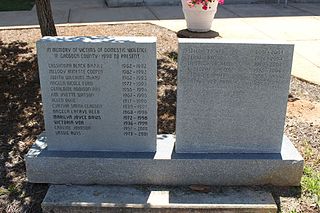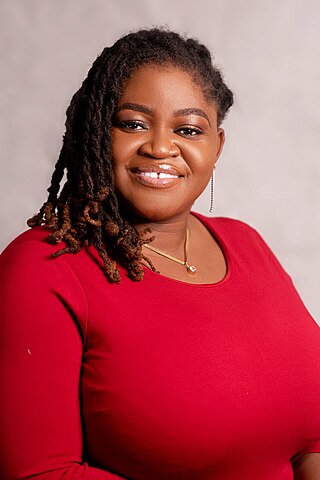Dorchen A. Leidholdt is an activist and leader in the feminist movement against violence against women. Since the mid-1970s, she has counseled and advocated for rape victims, organized against "the media's promotion of violence against women", served on the legal team for the plaintiff in a precedent-setting sexual harassment case, founded an international non-governmental organization fighting prostitution and trafficking in women and children, directed the nation's largest legal services program for victims of domestic violence, advocated for the enactment and implementation of laws that further the rights of abused women, and represented hundreds of women victimized by intimate partner violence, human trafficking, sexual assault, the threat of honor killing, female genital mutilation, forced and child marriage, and the internet bride trade.

The National Network to End Domestic Violence(NNEDV) is a 501(c)(3) not-for-profit organization founded in 1990, based in the District of Columbia. It is a network of state and territorial domestic violence coalitions, representing over 2,000 member organizations nationwide. The National Network to End Domestic Violence works to address the many aspects of domestic violence.

Domestic violence is violence or other abuse that occurs in a domestic setting, such as in a marriage or cohabitation. Domestic violence is often used as a synonym for intimate partner violence, which is committed by one of the people in an intimate relationship against the other person, and can take place in relationships or between former spouses or partners. In its broadest sense, domestic violence also involves violence against children, parents, or the elderly. It can assume multiple forms, including physical, verbal, emotional, economic, religious, reproductive, financial abuse, or sexual abuse. It can range from subtle, coercive forms to marital rape and other violent physical abuse, such as choking, beating, female genital mutilation, and acid throwing that may result in disfigurement or death, and includes the use of technology to harass, control, monitor, stalk or hack. Domestic murder includes stoning, bride burning, honor killing, and dowry death, which sometimes involves non-cohabitating family members. In 2015, the United Kingdom's Home Office widened the definition of domestic violence to include coercive control.
Specialized domestic violence courts are designed to improve victim safety and enhance defendant accountability. There is no one set definition of a specialized violence court, although these types of courts can be either civil or criminal and typically hear the majority of an area's domestic violence cases on a separate calendar. Additionally, these courts are typically led by specially assigned judges who can make more informed and consistent decisions based on their expertise and experience with the unique legal and personal issues in domestic violence cases.
Futures Without Violence is a non-profit organization with offices in San Francisco, Washington, D.C., and Boston, United States, with the goal of ending domestic and sexual violence. Futures Without Violence is involved in community-based programs, developing educational materials, and in public policy work.
The anti-rape movement is a sociopolitical movement which is part of the movement seeking to combat violence against and the abuse of women.
Coalition to Abolish Slavery and Trafficking (CAST) is a Los Angeles-based anti-human trafficking organization. Through legal, social, and advocacy services, CAST helps rehabilitate survivors of human trafficking, raises awareness, and affects legislation and public policy surrounding human trafficking.
Sexual Assault Awareness Month (SAAM) is an annual campaign to raise public awareness about sexual assault and educate communities and individuals on how to prevent sexual violence in the United States. It is observed in April.

The Pennsylvania Coalition to Advance Respect (PCAR), known as the Pennsylvania Coalition Against Rape from 1975 to 2023, is an organization that opposes rape and sexual violence in Pennsylvania and the United States, and advocates for victims of sexual violence.

Domestic violence in United States is a form of violence that occurs within a domestic relationship. Although domestic violence often occurs between partners in the context of an intimate relationship, it may also describe other household violence, such as violence against a child, by a child against a parent or violence between siblings in the same household. It is recognized as an important social problem by governmental and non-governmental agencies, and various Violence Against Women Acts have been passed by the US Congress in an attempt to stem this tide.
The National Domestic Violence Hotline (NDVH) is a 24-hour confidential service for survivors, victims and those affected by domestic violence, intimate partner violence and relationship abuse. Advocates are available at 1-800-799-SAFE (7233) and through online chatting at www.TheHotline.org. All calls are free and confidential. The NDVH was created through the Violence Against Women Act (VAWA) in the United States. The NDVH offers a variety of help options. The NDVH provides information on topics such as domestic violence, financial abuse, LGBTQ relationship abuse, domestic violence policy updates, advocate information, what to expect when calling the hotline, and life after abuse and domestic violence. The NDVH launched loveisrespect, a resource empower youth to prevent and end dating abuse and promote healthy dating relationships.
Celia Williamson is an American University of Toledo Distinguished Professor of Social Work and Executive Director of the Human Trafficking and Social Justice Institute, as well as researcher and community advocate who seeks to combat domestic human trafficking and prostitution. She was named the 26th most influential social worker alive today.
Abusive power and control is behavior used by an abusive person to gain and/or maintain control over another person. Abusers are commonly motivated by devaluation, personal gain, personal gratification, psychological projection, or the enjoyment of exercising power and control. The victims of this behavior are often subject to psychological, physical, mental, sexual, or financial abuse.

Lois Galgay Reckitt was an American feminist and activist. Called "one of the most prominent advocates in Maine for abused women", she served as executive director of Family Crisis Services in Portland, Maine, for more than three decades.
The Illinois Coalition Against Domestic Violence (ICADV) is a non-profit organization of member organizations throughout Illinois that provide services for persons experiencing domestic violence. ICADV also works with health providers, community groups, religious groups, criminal justice agencies, and federal and state offices to supply services, support, and justice.
Patricia Occhiuzzo Giggans, also known as Patti Giggans, is a Los Angeles–based feminist activist and advocate for supporting victims of domestic violence.

Toni Hasenbeck is an American politician who has served in the Oklahoma House of Representatives from the 65th district since 2018.

Osasu Edobor is a Nigerian gender advocate and founder of Think Help Restore (THR) Media and the Safe Space Initiative. She is a licensed mental health first-aider, peer educator trainer, and counselor. As a campaigner for gender inclusion, Osasu created the HERFessions app, which provides support for survivors of sexual abuse. She is a 2018 Mandela Washington Fellow alumna and a Young African Leaders Initiative member.
The National Indigenous Women's Resource Center (NIWRC) is a nonprofit organization that provides health resources to Native American women and also advocates for women's health, housing, and domestic violence support. The organization was founded and is led by Native American women.







